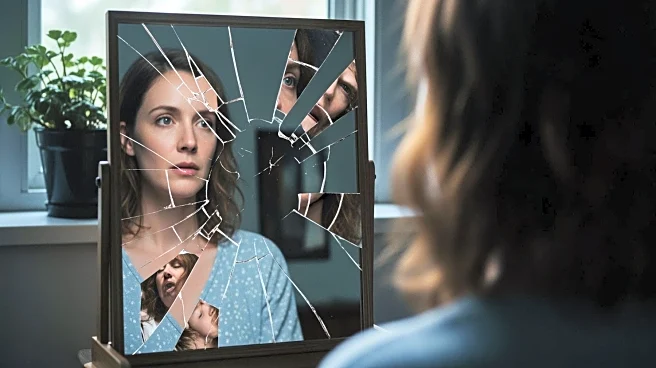What's Happening?
The film 'Die My Love,' directed by Lynne Ramsay and starring Jennifer Lawrence, delves into the complexities of maternal rage and mental health. Based on Ariana Harwicz's novel 'Matate, amor,' the movie follows Grace, played by Lawrence, as she navigates
the challenges of motherhood and personal identity. Set in a decrepit house filled with memories, Grace's journey is marked by her struggle with postpartum psychosis, leading to a series of unpredictable and intense events. The film, which also features Robert Pattinson, explores themes of creativity, destruction, and the blurred lines between reality and fantasy.
Why It's Important?
The film's exploration of maternal rage and mental health issues is significant as it brings attention to the often-taboo subject of postpartum psychosis. By portraying the raw and unfiltered emotions of a mother in crisis, 'Die My Love' challenges societal norms and expectations surrounding motherhood. The film's depiction of mental health struggles can foster greater understanding and empathy, potentially influencing public discourse and policy on mental health support for new mothers. Additionally, the collaboration of prominent figures like Jennifer Lawrence and Lynne Ramsay highlights the importance of diverse storytelling in the film industry.
What's Next?
As 'Die My Love' hits theaters, it is likely to spark discussions on mental health and motherhood. The film's release may lead to increased awareness and advocacy for mental health resources for mothers. Critics and audiences will likely engage in conversations about the film's portrayal of complex emotions and its impact on viewers. The performances of Jennifer Lawrence and Robert Pattinson are expected to be a focal point of reviews, potentially influencing their future projects and collaborations.
Beyond the Headlines
The film's narrative raises questions about the societal pressures on women to conform to traditional roles and the consequences of failing to meet these expectations. 'Die My Love' challenges viewers to reconsider the stigmatization of mental health issues and the need for more open dialogues about the challenges of motherhood. The film's artistic approach, combining intense imagery and a non-linear storyline, may influence future cinematic portrayals of similar themes.















